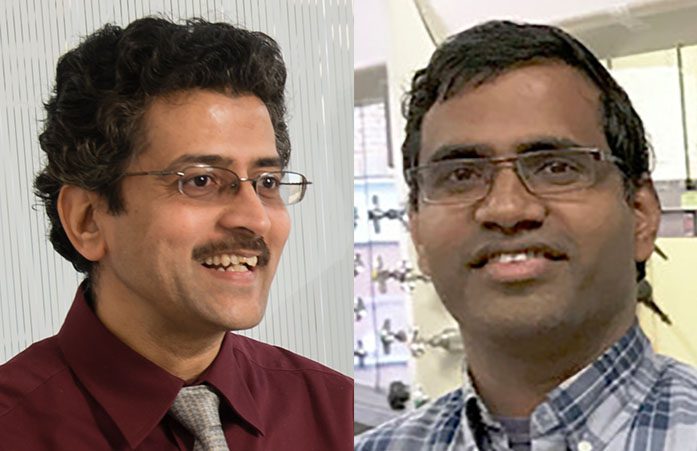CLEMSON, S.C. – When life gives you lemons, make lemonade. And when a pandemic ends opportunities to travel to conferences and grow networks of students and professors, follow the lead of Dillip Panda, a postdoctoral researcher in the College of Science’s Department of Chemistry.
Panda and Apparao Rao, Founding Director of the Clemson Nanomaterials Institute (CNI), are the driving forces behind CNI’s International Webinar on Functional Energy Materials, a free, virtual conference to be held Nov. 18-19 on Facebook, YouTube and Zoom.
Attendees must register before Nov. 15 using this link. Students and postdocs may submit poster abstracts at the registration link before Nov. 15. For more information, contact Dillip Panda at dpanda@g.clemson.edu.
“Clemson University is investing more and more in energy research – from battery work to fuel cells, solar power, wind energy,” said Rao, the R. A. Bowen Professor of Physics.
The broad topic of functional energy materials means an impressive list of international experts will be on hand to share information and make connections.
“We have a slate of excellent speakers who are all authorities in their own right,” Rao said.
Panda is president of the Clemson Postdoc Association. In a school year that is anything but typical, he planted the seed of an idea that is growing into a formidable event. Panda said he wondered how to help progress his field with traditional methods off the table for now.
“How can you make some impact for the Postdoc Association at Clemson?” he asked.
With Rao’s help and encouragement, Panda set out to include research and industry from around the world in an event that likely would have been impossible – or at least cost prohibitive – in a time of in-person conferences. And because this is entirely online, it is free and accessible to anyone with an interest in the subject.
Speakers will participate from across the United States, the United Kingdom and beyond.
“We looked at their research background, what kind of research they’re doing,” Panda said. “This is a benefit for the students and the faculty. Because of this platform, students who are looking for their next job can come together to find a network.”
“This webinar creates a platform for students and postdocs to participate, meet the world leaders, receive a certificate if they want to, or win a poster competition – they can list all of these in their resumes to convey their broad knowledge base of energy materials to their future employers,” Rao said.
Researchers may find new collaborators as well.
“Professor Rao’s leadership in the field of materials for energy is inspiring to research communities inside and outside of Clemson,” said Stephen Creager, associate dean in the College of Science. “I am happy and proud to see Clemson faculty leading in this way.”
Because the subject matter permeates every aspect of life, the event might even change the course of how research and industry leaders connect, well after the pandemic ends.
“Energy is a very important topic,” Rao said. “Without energy, nothing moves. It is a fundamental need that drives our civilization; therefore, it’s always good to invest in it. It’s going to be fun, I think.”
Day 1 events:
“Hole-Transporting Materials (HTMs) for Perovskite Solar Cells”– Prashant Sonar / Queensland University of Technology (QUT), Australia
“Applications of Triplet Fusion Up Conversion” –Daniel N. Congreve / Stanford University
“Light Capture and Conversation from Nature Inspired Energy Materials” – Francis D’Souza / University of North Texas
“Precise Synthesis of p-conjugated polymers and the yin and yang of polymer morphology” – Christine Luscombe / University of Washington
“Graphene-based Solid-State and Flexible Supercapacitor Operating at -70 °C to 220 °C” – Manas Gartia / Louisiana State University
“Functional Electrochemical Material” – Lynn Dennany / Strathclyde University, Scotland
“Revealing the Mechanism of Hydrogen Evolution Activity in 2D Titanium Nitride MXenes via InSitu/Operando Spectroscopy and Microscopy” – Abdoulaye Djire / Texas A&M University
Day 2 events:
“MXenes for Energy Storage and Conversion Applications” – Yury Gogotsi / Drexel University
“Understanding Charge Carriers in Organic Photovoltaic Materials” – Tracey Clarke / University College London, UK
“How the Surface Chemistry of WO3 Influences its Activity for the Oxygen-Evolution of Chlorine-Evolution Reactions” – Bart Bartlett / University of Michigan
“Innovating Towards More Sustainable Catalysts for Fuel Cells and Electrolyzers” – Sanjeev Mukherjee / Northeastern University
“Tailoring Electrode-Electrode Interfaces in Lithium-ion Batteries Using Molecularly Engineered Functional Polymers” – Laisuo Su / Carnegie Mellon University
“Functional Quantum Heterostructures for Energy Conversion” – Sanjay Behura / University of Arkansas, Pine Bluff
“Novel Ways to Interact with Your Research and Data” – Jeff Siler (CEO and Founder) / Interactive Display Systems, Inc.
Get in touch and we will connect you with the author or another expert.
Or email us at news@clemson.edu

